by Rahul Iyer
How I left my consulting career behind and broke into tech

Three months ago, I moved to San Francisco — one of the most expensive cities on Earth — with no job, no housing, and barely any money.
Plenty of people thought it was crazy. They’d thought I was crazy to leave behind a prosperous career in consulting five months ago, and they really thought I was crazy now.
But here I am. Today I have a dream role at a startup as a Product Manager building out a mobile application with people I love. So how did I get here? And, more importantly, why do you care?
This isn’t a how-to article, but rather a knowledge drop of all the things I experienced over the past few months, and everything I’ve learned from those experiences.
Always keep in mind that the world is ever-changing. Don’t let yourself lag behind.
This is my story
It was September 27, 2016. After months of contemplating the big move, I called my friend Prateek. I was seeking guidance, as he made a similar move roughly a year prior. I told him of my plans to try and get into a coding bootcamp like Hack Reactor or App Academy to hone in on my technical skills, so I could eventually be better suited for a product management role.
He then put me in contact with his friend Artur, with whom I scheduled a call shortly after. Artur made a transition into software engineering from investment banking, after attending Hack Reactor.
I told Artur the same thing I told Prateek. What he said next sealed the deal, and my mind was made up.
“Dude, you don’t need to do that. If you’re willing to spend that money, why don’t you just come out to SF, line up interviews, and simultaneously look for a job? Get the initial experience you need elsewhere.”
I’m paraphrasing his words, but you get the idea. Artur kick-started what would become one hell of a journey for me, and a friendship between Artur, his twin brother, Timur, and Ruben — the Breaking into Startups crew.
A couple of days later, I had coffee with a professor from Georgia Tech, whose class I took in college. He’d been a mentor ever since, so I figured he could provide some insight.
Boy, was I right. It turns out that he’d made a similar move out to California, with little to no money, and couldn’t have advocated for it more. He constantly referenced it as one of the best decisions of his life.
As I drank the last bit of my cappuccino, he offered to introduce me to any of his connections on LinkedIn I felt I could resonate with. My professor had sparked an undiscovered passion that would change my life — building relationships.
Professor — I wanted to take the time to thank you here. I owe you one.
It was now mid-October, and after speaking with Artur and my professor from college, I knew getting more product management experience was essential. I was a consultant — good at what I did. I had even run my own startup in college, but nothing that directly correlated to a product role in tech.
Lightbulb.
My friend Christian Zimmerman, the founder of Qoins, had just started to get off the ground with his startup. They’re basically the Acorns of debt — a product I could get behind and definitely a great opportunity to gain some experience.
I hit him up and pitched to him to let me “consult and be on a contract” as a Product Manager for them. I’d work for free, and they’d pay for my parking.
Here’s a snippet of some of the work I helped them with.
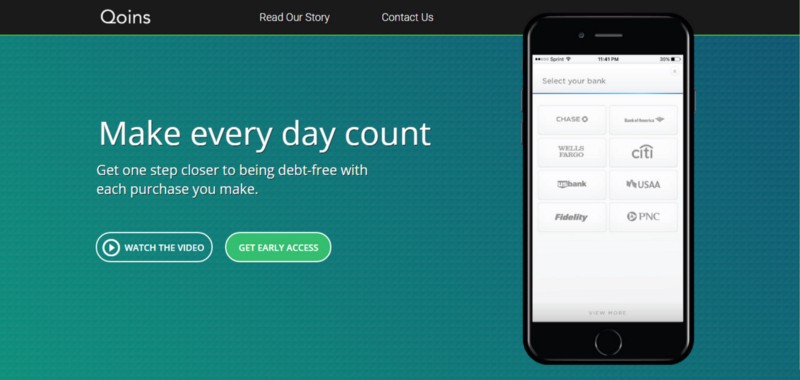
We took their old website and really dove into what information users wanted, how to get users to signup, and how to keep them coming back (growth and retention rates, for my product folks).

Through the redesign and a launch of the iOS app, we were able to decrease the user bounce rate by 10%, increase total signups by ~31%, and active users by ~69%. Truthfully, I’m still contemplating whether we picked the right definition for an active user — but this topic is for another day.
What a steal for them, right? And all for just $15 worth of parking. Well, it might have been a steal for them, but I couldn’t have been more grateful. I credit most of my interviews and coffee meetings to this experience, but more on that later.
Experience was a major player, and there’s always room for more of it. If you don’t have it, find a way to improvise for it. It may not be through a job, but a side project, cheap contract role, or even just helping out a friend. It can all prove to be valuable down the line. Win small.
November 4th was my last day as a consultant in Atlanta. I had two more months in the city I call home, and then I’d be moving out to San Francisco. After budgeting, I had about six months worth of cash to spend. There was no turning back now.
One week had gone by.
Holy. Hell.
It started to settle in.
Did I make the right decision?
I started to get nervous. The adrenaline rush of quitting my job had worn off. The fear of the unknown started to foster.
Time out.
Let’s take a second to talk about “the fear of the unknown.”
It’s one of the most primitive and dominant emotions for human beings. Uncertainty causes an uneasiness in people. But how do we get over this? Well, the answer is subjective, but here’s what I did.
- Isolate the source. What was stressing me out? I realized I woke up every morning with no real structure or routine for the day — no job or duties. Being an athlete my whole life, and then a consultant, this was simply foreign to me.
- What’s the worst that can happen? Most of the time, the worst is something that is not really that bad. The worst for me? Going back home to my parents house in Atlanta and living there until I could figure something out. Don’t get me wrong. I’m 24, and don’t want to be living in my parent’s basement. But hey, again, it’s not really that bad.
- Plan for the immediate future. Getting caught up in the uncertainty, I often found myself imagining every possible scenario that could happen. It’s important to understand winning small adds up. Plan for the small things on a daily basis to set yourself up for the larger goal. Don’t get caught worrying about things out of your control. It does you no good.
- Enjoy it. Over time, the fear of the unknown became a thrill. I learned to appreciate the variability and reward that sometimes comes along with it.
Wow. One month of unemployment had flown by, and at this point, I was willing to take anything that sounded cool and try to laterally move my way into a Product Manager role from there.
Silly, right? Only one month, and I’m already willing to compromise my dream.
I had interviewed with Uber, Workday, DoorDash, and multiple other startups. I made it to the final rounds for most of them. There were two where I walked away from the process. The rest ended in flat-out rejections — in some cases from companies where I’d been so certain that I’d crushed it during the interview.
Upon asking for feedback, this is what I received and some of my immediate thoughts — humor me:
“You were a great candidate, but don’t have the years of experience we want.”
What? Come on. Who is ever going to have 5+ years of experience for a role where you’re hiring a fresh college graduate?
“We decided to pursue other candidates whose qualifications better fit our needs at this time. We hope that you consider us again for employment in the future.”
The future? I want to be employed now.
“We don’t feel you are a perfect fit for the [position]. That being said, we are rapidly growing and our needs are constantly changing, so please feel free to keep an eye on our careers page and apply to any positions that are of interest to you.”
Okay. I might have blown this interview, but really? Completing a take-home exercise for hours on end, only to receive this in response — soul crushing. Dramatic, I know.
[Silence]
[Crickets]
[More Silence]
Yeah, that was after three follow up emails. Why me?
At this point, you could say I was feeling pretty bitter.
What am I doing so wrong that I can make it to most final interviews, but then let the offer slip right through my hands?
Do I suck at closing? Am I saying something wrong during these interviews?
While I certainly responded emotionally on my end, I think it’s important to point out, everybody has thoughts like these. Rejection is tough. It provokes an emotional responses. But, that’s okay — we’re only human.
Read on. I’ll explain to you what I did to combat this and how little it actually affected me later on, because trust me, the rejection definitely didn’t stop to care about my feelings.
Still in Atlanta, I asked my old college advisor if she would meet me for coffee (there’s a theme here). She had given me quite a bit of advice throughout college — I figured why not now?
Nonetheless, meeting with her was a pivotal moment in the “funemployed” lifestyle I’d fearfully started to become more comfortable with.
She dropped two pieces of advice on me:
LinkedIn’s Alumni Page Feature:
Search for the college you attended/graduated from.
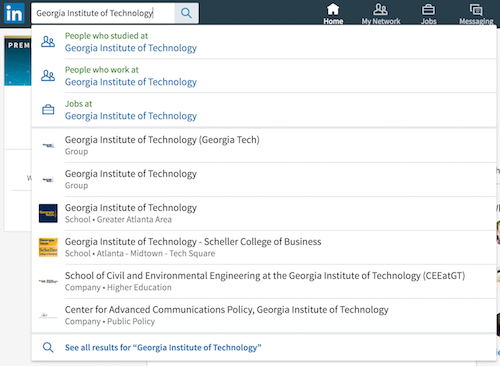
Go to ‘See Alumni.’

Now you can sort through alumni in different cities, companies, job roles, etc. It’s one of the easiest tools to find alumni to reach out to — a huge contributing factor to how I built more relationships.
“A good job search is a huge list of no’s and one yes. It only takes one.”
This was the single piece of advice that kept me moving with each rejection I received. I could get one “yes.” The right yes.
A few more days trickled by. I decided to kick it up a notch. Speaking with my college advisor made me realize I needed to meet as many people as I could, face to face. Impulse decision — but I booked my ticket to San Francisco STAT.
I know… dicey. I was banking on actually getting these meetings. But sometimes, knowing you have everything to lose is all the motivation you need.
My goal was to send 50 cold emails/LinkedIn messages a day to people I think I could learn from.
So ambitious.
Yeah, that quickly dropped to 25 messages a day. I noticed at 50, the quality of my emails became poor. I wasn’t doing enough research on the person I was emailing beforehand and was essentially using a cookie cutter email template. Therefore, my response rate was low. Really low.
After the adjustment, I sent out 25 messages a day, Monday through Friday until January 6th.
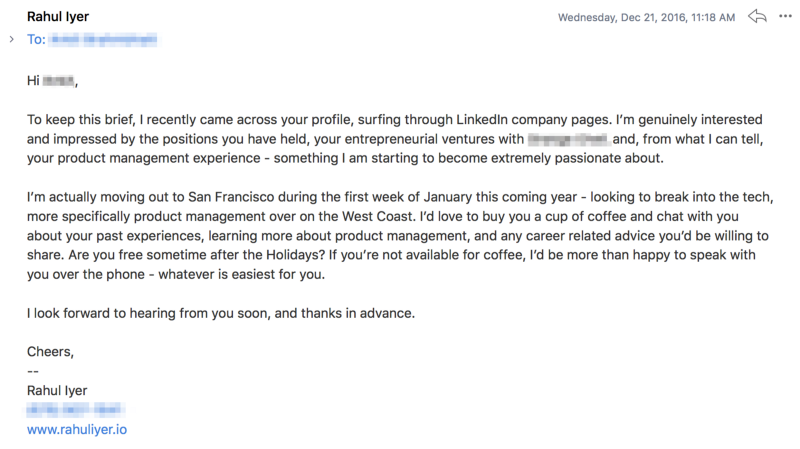
That’s 15 days, 365 messages.
Out of 365 messages, I ended up with 75 coffee meetings and phone calls.
That’s a ~21% cold message to coffee meeting/phone call conversion rate.
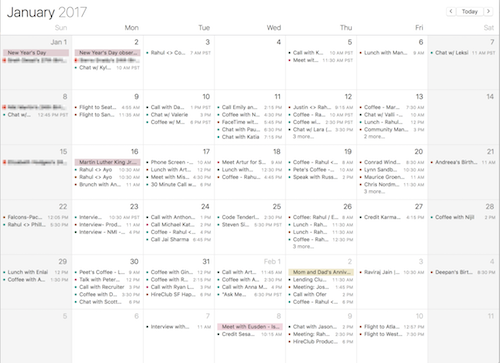
My response rate drastically increased. You’d be so surprised how willing people are to help you out if the interest conveyed is genuine.
In the midst of all that was going on — two days before the New Year, I received news that one of my best friends and past co-founder, Alex Prinzi, had passed away.
Look, some things you just can’t prepare for.
It was a whirlwind of a day, and I debated writing about such a personal experience here. But Alex, and his twin brother, Leo, played such an integral part in my life from the entrepreneurial experiences we shared together (running our startup, Wazo, and provisionally patenting Cheer Straps), to the genuine friendship, unintentional mentorship, and camaraderie I grew to have for these two.
Everybody should find something that motivates them to do better than they did yesterday. For me, part of that was Alex — the man who lived life to the fullest. It would be an incomplete story without mentioning him. I wouldn’t be half of where I am today without him. Miss ya, buddy — this one is for you.
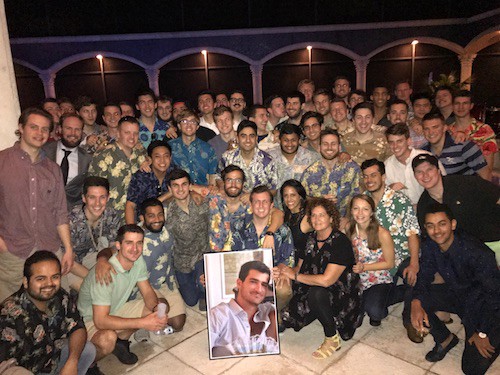
The Friday before I was supposed to fly out to SF, I made a spur of the moment decision to drive out to Houston with a friend through the night, stay the weekend, and fly out of there the following Monday. It was cheaper. I was trying to save money.
Is this relevant to the story? Nope. But not everything about looking for a job is about looking for a job. I still had a life.
It was D-Day. I boarded my plane. It started to take off, and it hit me like a wall. I was going to be leaving great pay, great people, and 24 years worth of experiences back in Atlanta.
I’m actually doing this.
Everything I had planned is now in full-swing. It’s time to prove to myself and everybody else if I could actually make it. I’m doing it live — no looking back now.
During the flight, I realized nobody knows me in SF. I need a way to get my face across to thousands of people quickly.
But how?
LinkedIn.
I typed up a post that probably took me the whole flight to come up with, and even then, it was pretty horribly written. But screw it, I decided to post it when I landed anyways, and see where it goes.
We touched ground, and I immediately called an Uber to my buddy Prateek’s place. He so graciously allowed me to crash in his closet.
No, seriously. I lived in a closet for a month.
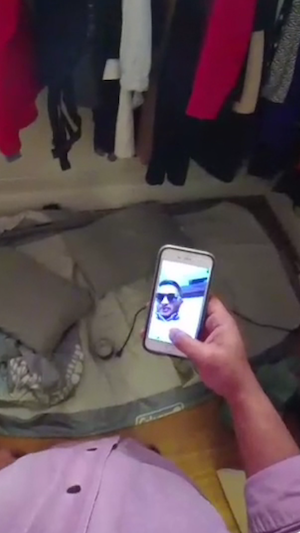
To paint a picture — it pretty much fit a twin size air mattress and my two suitcases. That’s it. Oh, and I had to walk through the bathroom to get to it. It was an interesting place to stay for one month, but I did what I had to keep costs as low as possible.
Thanks Prateek. Seriously.
The very next day, the daily grind of coffee meetings, phone calls, and interviews began.
What do I say when I meet these people? What’s the end goal of each meeting? How do I make sure they do what they say they will do?
Speaking with people you have never met can be extremely intimidating, let alone people who may be far more experienced than you. Somethings that helped me prepare for these meetings (sometimes with quite a learning curve), I’ll list below.
Find everything online about the person you’re meeting and read! I looked through their LinkedIn, their past positions, companies sold, their interests, where they’ve lived — I even found an email address through a picture someone posted on Twitter in 2014. Yeah, I felt pretty creepy, but understanding what they have done only gives you more points to connect within a conversation. People love to talk about themselves. Use that to your advantage.
Thank them and show appreciation when you meet them. The very first thing I did, almost every time, was show them I cared that they came out to speak with me.
Thanks [name], I appreciate you taking the time to come out and speak with me. It means a lot.
People respond differently to questions. Understand what they want. Some people I met loved open-ended questions, where they’d go on for 30 minutes talking about themselves. Others loved pointed questions, for which they could answer quickly (think rapid fire). Honestly, I played it by ear and threw one or two of each at them to find out where they stood.
Okay. That’s all good and dandy, but how do I get something out of it?
Learn to hate networking. Build relationships. I couldn’t stress this enough. Meeting people while on the job search doesn’t need to be transactional. Build the relationship with the person, and something will come of it in the future. Everybody has needs, you’d be surprised how quickly you can make yourself a fit.
The more people you foster a genuine relationship with, the more will flock to you. I call this the 10x Effect (part of a phrase I stole from a few friends). It’s a matter of taking the time to build the foundation with each person you come across. Eventually, it becomes second-nature.
The goal is to get another meeting (whether it’s with them or someone else). At the end of every meeting, I asked the same question.
Is there anybody else you feel like I should reach out to? The way you ask this question matters.
If you ask them if THEY can introduce YOU to someone — well, that adds a level of unneeded pressure. Chances are they do have someone in mind, but they want to feel as if they are in control of their own actions. Give them that control. When you say, YOU’D be happy to reach out to people THEY may know — more often than not, they’ll say one of two things:
1. I think [name] would be great for you to chat with, I’ll introduce you to them myself.
Great. You now have something to follow up with on and a potential next meeting set.
2. Hmm… I’m not too sure right now. I can’t think of anybody.
Don’t fret. This could be a legitimate thing. It’s tough to just spitball names off the top of your head. It’s easy to respond in this situation.
It’s no rush. To make this easier for you, I’d be happy to connect with you on LinkedIn and send you an email if there’s anyone I think would be great to learn from.
Yeah, sure — let’s do that.
Now, you have a reason to follow up with a name or two of people they know that might be of interest to you. Again, can’t stress this enough — try not to make this transactional. It pays ten fold to maintain relationships. A prime example unfolds later on in my story.
Remember that post I created for LinkedIn? Here’s a screenshot of it.
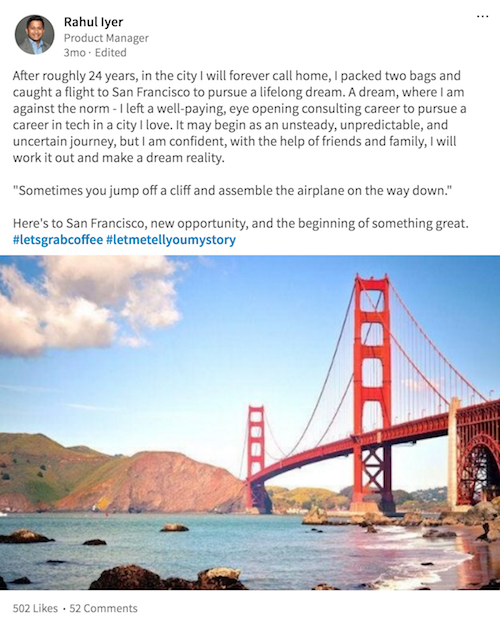
It’s nothing fancy — just a cheesy piece of writing with a nice picture of the Golden Gate Bridge.
52 comments.
502 likes.
~200,000 views.
Pinch me.
It worked. It really worked.
Because of this post, I received numerous recruiter phone calls, hundreds of people offering to help, and a countless number of people encouraging me on — all from a stupid post I wrote up on the airplane over to San Francisco. I even had one guy offer to house me.
Being active on LinkedIn is crucial — both during your job search and even once you’ve landed a job. I could only imagine how many people this post would have reached had I continued to build a presence on LinkedIn throughout my entire career (instead of just when I was looking).
Again — I just want to point out how underutilized LinkedIn actually is. Use it.
Pushing three weeks into West Coast living, I met Eusden. I had reached out to him via a cold email about two weeks prior. He had a solid PM background at Pinterest and Hulu — thought I might be able to learn a thing or two from picking his brain.
We met at Bravado, the coffee shop right across the street from AT&T Park. We had a normal conversation, nothing too mind blowing. Eusden was great to speak with and promised a few introductions to a few friends of his.
Awesome — just what I was looking for.
Time flew by, and I was nearing three months of unemployment. I was getting close — or, so I thought. As mentioned earlier, I had about 75 coffee meetings and phone calls through the month of January. I landed 9 total interviews and 6 final interviews.
Hell yeah. I’m killing it.
I prepped like a mad man for those interviews. It was time to go crush them in the next couple of weeks.
A couple of more days trickled by. I had just gotten off the phone with Eusden. He offered me a contract role to work at the startup he is advising.
What? That was random.
Do I take it? Is it worth it?
Yup — I took it. It was a more than generous hourly pay, and I could certainly use the cash to keep my savings afloat.
In addition, the mutual understanding between us was simple.
- I worked when I could, because it was understood I was looking for a full-time role simultaneously.
- If we didn’t like working with each other, we’d part ways — no hard feelings.
Really, this was the best situation for me to be in, but I was far too naive to realize it at the time.
6 final interviews, right?
I might as well have had egg on my face.
Rejection.
Rejection.
Rejection.
Rejection.
Walked away from offer.
I’m an idiot.
Rejection.
I received 5 rejections and walked away from one offer, over the span of two days.
Come on! What in the world was I doing wrong?
Let’s talk about Imposter Syndrome for a second.
At this point, I felt like I was a fraud. I had come up with a million and one ways to get these interviews (building a product of my own, helping Qoins, etc.), all of which were legit — but every time I failed to get an offer. I started to believe I was faking the hard work I had put in.
I couldn’t have been more wrong.
In hindsight, I did everything right. Sure, I bombed one interview so bad, but the other 4? Well, the truth is there are so many external factors that you cannot control — trying to justify it will drive you insane.
Instead, ask for feedback and move on.
Additionally, spinning your outlook on these events can drastically change how you perform/tackle the next interview. For example, these rejections helped me realize what companies in the Valley are looking for in a PM. I started to pick and choose different tactics that worked at like-minded companies. It ends up panning out for me in the future.
Back to thinking I was doomed — I panicked.
What do I do now? How can I convey that I’m not just good, but great?
Build.
My good friend Kevin (whom we all call Guebert AKA Goobs) and I had been toying around with the idea of an Amazon Alexa dating app for a while.
Well, the opportunity struck. He called me up on Sunday night and convinced me we should apply to Voicecamp. The application was due on the 28th.
*Facepalm*
“Goobs, we practically have one night to complete this.”
He somehow convinced me. We stayed up late that night and cranked out an Alexa dating app we named, Vocado. It was pretty much a really crappy, highly NON-functional prototype — for which we shot a lame homemade video to go along with it.
Submit.
It was the waiting game from here on out, but we had zero expectations of actually getting the first interview.
It was the beginning of March. I was at work (my contract gig), I opened my phone to 5 missed calls and 3 missed texts from Goobs.
That’s unusual — the hell does he want to talk to me so bad for?
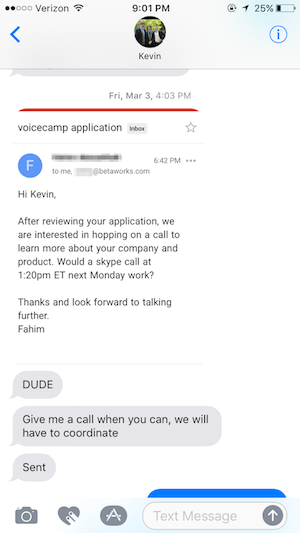
No freaking way.
I was bugging out. I called him immediately. We had made it through the initial screening and were asked to schedule an interview. We couldn’t believe it.
We crushed it, right?
LOL.
I’ll cut to the chase. After a few questions, it was very apparent we weren’t going to get through to the next round. We had zero business model, no real working prototype to download or in an App Store to show — we made this in one night for Pete’s sake.
But, that’s okay. It taught us a few things.
We were scrappy enough to get something off the ground in one night to get the attention of someone willing to invest in our product. Talk about product validation.
Goobs and I work together well. What else could we make?
But most importantly, I now had another product to showcase in interviews and conversations. And damn, was this one a winner. Being able to put this down on my resume almost always sparked a conversation in interviews.
You built a dating app for Alexa?
Yup — in one day (to be read in Dr. Evil’s voice from Austin Powers).
It was at this moment where I learned the value of just doing it.
You want to be a software engineer? Write code for something.
You want to be a growth hacker? Growth hack something.
You want to be a Product Manager? Ship something.
Just go do it.
By mid-March, things were going smoothly. I had learned from my experiences and mistakes and had finally come up with 4 more final interviews.
By this time, I had answers from 3 of those final interviews:
1 Rejection
2 Offers
The last interview was pending for the week after next.
Finally.
Things were starting to look good.
Oh, do you remember Eusden? Yeah, something interesting happened.
That same Friday, Eusden threw a curveball at me. He offered me a full-time PM role at the startup I had been contracting to.
The guy I reached out to through a cold email, then grabbed coffee with, then contracted for the startup he was advising, just offered me a full-time role.
Well, damn — do I take it?
For the first time in a while, I had a good problem on my hands.
March 29th was a glorious day for me. It felt like a thousand pounds of pressure were lifted off my shoulders. I had turned down two offers, walked away from the last final interview, and I accepted Eusden’s offer.
I couldn’t be happier.
You wouldn’t believe it.
“When it rains, it pours.”
A day after I had accepted my offer — Facebook and 2 other startups reached out to me offering interviews and wanting to chat.
Great. Now what?
Nothing. I established a relationship with those recruiters that reached out and moved on. I was happy. I loved the startup, loved the people I was working with, had the role I wanted, and most of all, could finally say I enjoyed what I was doing. There was no reason for me to back out. I know I had made the right decision.
It was so close to April Fools that I began questioning reality. But as I started the first day of my first week on the job, a new chapter of my life began. It felt great.
I enjoyed this day. I basked in it.
What I Continue to do Today
- Grab coffee with people everyday. Meeting new people and establishing relationships, even while you have a job, is key. It’s all about who you know.
- Find a mentor. This one is still in the works for me, but finding a mentor is, in my opinion, one of the quickest ways to grow.
- Add arrows to my quiver. I constantly challenge myself to leap out into the unknown, keeps me on my toes and makes me learn new things.
The Gems AKA Resources and Knowledge Drops
Unconventional moves require unconventional strategies. By no means are these the only useful tools, tips, articles, and people, but it certainly can help you get a jump start. Use them as you may.
Coffee Shops
Coffee shops serve a number of purposes. Meet people. Grind out some work. Read a book. Here are some I love and constantly frequent. I can only speak for Atlanta and SF, as these are the only two cities I have lived in, but feel free to add your favorites in the comments.
Atlanta:
1. Switchyards (Downtown)
2. Dancing Goats (Ponce City Market)
3. Chattahoochee Coffee Company (Vinings)
4. Taproom (East Atlanta)
SF Bay Area:
1. Blue Bottle (Mint Plaza)
2. Crossroads Cafe (South Beach)
3. Awaken Cafe (Oakland)
4. Covo (SOMA)
Helpful Blog Posts & Books
It’s good to read. Below are some great articles from great people — the topics range from product management, to salary negotiations, to life in general.
- Building Products (Julie Zhuo)
- How not to bomb your offer negotiation (Haseeb Qureshi)
- Ten Rules for Negotiating a Job Offer (Haseeb Qureshi)
- I just got a developer job at Snapchat. Here’s what I learned and how it can help you with your job search. (Jon Deng)
Facebook Groups
Community is key — finding a group of people trying to do the same things as you or already have done what you want to do are a must. Writing a new chapter in your life is daunting, so look for a community to ask “the stupid question,” build relationships, or ask for a referral. These are a few FB groups/communities that have aided me tremendously through this process.
- Breaking into Startups — It’s not always easy to get your footing in the startup world, but the name says it all…give it a shot.
- HireClub — Looking for an interview with the nice perk of a referral? HireClub has quality listings for people looking to be referred by others. The only catch is you have to be invited by someone to join.
- Albert’s Job Listings & Referrals — Another job postings/referrals Facebook group that has quality listings and people who are truly eager to help.
Podcast Episodes/Audio Books/eBooks
- Haseeb Qureshi (Breaking into Startups) — I’ll admit it, the man takes life by storm. Haseeb kills the negotiation game and has little gems of advice I think are valuable.
- Kevin Lee (Breaking into Startups) — For those who have no idea where to begin as a PM, begin here. Kevin has built a great community to foster early career PMs.
- Modern Romance (Aziz Ansari) — It’s hilarious. You need a break every once and a while. Why not with Aziz?(You have to get the audio version for this one. It’s worth it.)
- Cracking the PM Interview (Gayle Laakmann McDowell & Jackie Bavaro) — If you’re a PM in the interview process, I highly recommend this book. It does a great job of breaking down the different types of interviews a PM could go through and much more.
- Chaos Monkeys (Antonio García Martínez) — This is an interesting and hilarious account of Silicon Valley and a reflection on random failures. It’ll probably be a nice change from most reads.
- Inspired (Marty Cagan) — Cagan does a great job explaining how to create products customers love. I believe all sorts of people can benefit from reading this, not just Product Managers.
Meetups & Slack Channels
- Product Manager HQ — Kevin also has a great Slack channel. I’ve cold messaged PMs on there for coffee.
- Product School on Wednesdays — Every Wednesday, Product School hosts a PM from great companies. Usually these PMs have plenty of experiences to share. Pick their brain, meet some like-minded people, and build relationships.
- HireClub — Once you’re in the FB group, keep an eye out for their events. They’re awesome, full of people looking to meet new folks.
People
If you haven’t noticed, I’m big on building relationships — asking for nothing but their time and experiences. Here are some key players who really made all the difference for me. Feel free to reach out to them. They don’t bite.
- Eusden Shing — The man who took a chance on me. It started with a cold email, then a coffee, then a contract role, and finally a full-time offer. I hope only to repay someone else in the same way.
- Artur Meyster, Timur Meyster, & Ruben Harris — The homies who make podcasts look easy. These three certainly had an influence in making things 10x. They’re the truth.
- Prateek Kumar — The friend who housed me in his closet for the first month. Yes, I literally lived in a closet behind the bathroom.
- Jon Deng — The guy I found in a Meetup line. Jon crushed the job search and ended up at Snap as a developer.
- Leslie Poortman — The woman who reached out to me over LinkedIn offering her help. She introduced me to friends and drove me to Meetups. These kind-hearted people exist, I promise.
- Lyle McKeany — The man who helped me despite being in the job search himself. He taught me paying it forward doesn’t always have to happen after you “make it.”
- Phillip Klugman — The bearded man that got me three different interviews through relationships. He has a genuine interest in helping others.
- Christian Zimmerman & Nate Washington — The duo that took me on as a contractor at Qoins. One could say they gave me a quite a jump start.
- Karl Thomsen — The man who has genuine character, even when he has zero reason to show it. He’s one of those guys you hope to build a true friendship with.
- Kevin Guebert — The good friend and software engineer I built Vocado with — talk about a conversation starter.
- Sarah Lynn Bowen — The girl who read this damn post as many times as I did, just to make sure it read legibly. You’re welcome.
For those that helped me along the way, because there was a lot of you — know I didn’t forget you. I’m appreciative of everyone who stopped to take the time to listen to me. Thank you, sincerely.
Other Handy Things
Here are a few other things I came across during my search — no less or more important than the others above. Find what works for you.
- Product Manager HQ — If you’re trying to become a PM, look here. Kevin Lee has a solid framework waiting for you.
- Out of Office Hours — One of the best things on the internet, in my opinion. You get to schedule out time with people you may never have a chance to meet. I spoke with a co-creator of Product Hunt — pretty awesome.
- Headspace — When this was recommend to me, I thought it was a joke. But, I gave it a try — lifesaver. It helped me keep a clear mind and stay focused when I was juggling one two many things during my job search.
If you made it all the way down here — thanks for the read! I hope this has been helpful to you, and please feel free to follow me here and/or reach out to me via social media (Twitter, LinkedIn, Instagram) about anything. I’m an open book. Cheers!
Rahul Iyer is a Product Manager and entrepreneur with a deep passion for product and technology. People are his priority. Technology is his medium. Feel free to reach out and learn more about Rahul at www.rahuliyer.io.
